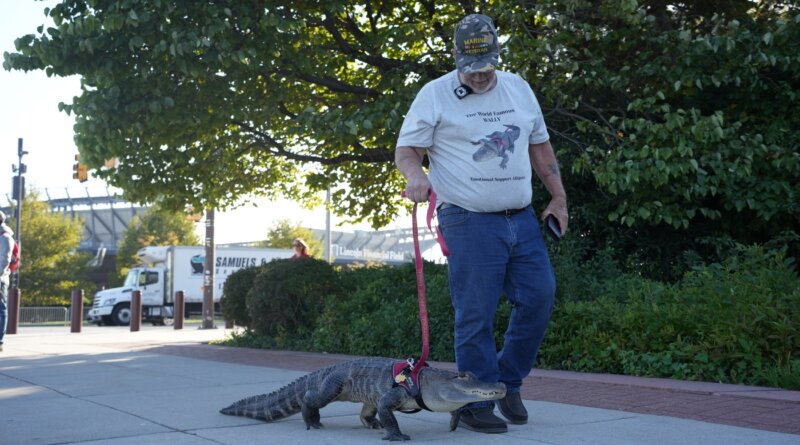An emotional support alligator at a Phillies game? What really happened : NPR
Joie Henney and his emotional support alligator, Wally, were denied entry to a Phillies’ game at Citizens Bank Park on Wednesday — but hope to be invited back soon.
Joie Henney
hide caption
toggle caption
Joie Henney

Joie Henney and his emotional support alligator, Wally, were denied entry to a Phillies’ game at Citizens Bank Park on Wednesday — but hope to be invited back soon.
Joie Henney
An emotional support alligator walks into a ballpark … and is asked to leave.
That’s the story that’s made headlines in recent days, thanks to viral photos and videos showing Wally — a six foot long, 55 pound alligator wearing a harness and leash — and his human companion outside of Citizens Bank Park during a Phillies game on Wednesday night.
But it’s not the whole truth, owner Joie Henney told NPR.
“We were not there to go to the ballgame,” said Henney, 70. “We were there to meet the players, was what we went there for, and I was invited. I didn’t just show up.”
To understand the backstory, you need to know — as Wally’s myriad of local admirers and online fans do — just how beloved this eight-year-old alligator is already.
Wally has more than 114,000 followers on TikTok and another 27,000+ on Instagram. He’s gone viral before, including for joyfully splashing around in the fountain at Philadelphia’s famous LOVE Park last summer.
He’s posed for photos at City Hall with the mayor of York and visited seniors at a local retirement home. And he was the visual reference for Alligator Loki in the hit Disney+ show Loki.
“He’s actually world-famous,” Henney said. Which is how he scored an invite to meet the Phillies.
Wally only goes where he’s invited
As Henney explained it, one of Wally’s fans — who visits him regularly from New Jersey — is also a big Phillies fan, and happens to be friendly with some of the players and their wives.
After hearing her rave reviews, the team invited Henney and Wally to Philadelphia, which is about two hours away from where they live in Harrisburg. Henney said they were there not to watch the game but to meet the players.
But by the time they got to the stadium, the players were already preparing for the game, said Henney. Since they were already there, his friend figured she’d buy them tickets to watch. But she didn’t ask about the rules for emotional support animals.
“We were standing in line waiting, they said I can’t take Wally because they only allow service animals … and I said ‘Okay, I respect what your rules are,'” Henney said. “There was no arguing, there was nothing.”
Citizens Bank Park’s policy prohibits all animals other than “guide dogs, service animals or service animals in training.” NPR has reached out to the Phillies for comment.
Henney emphasized that he wouldn’t have shown up with Wally unannounced: “I don’t go anywhere Wally is not invited.” (They do get invited to lots of other places, like restaurants and malls.)
He said that’s been missing in a lot of the headlines about this week’s outing, and wishes people wouldn’t be so quick to criticize.
“They think I’d just take him randomly to a ballgame,” he said. “I’m not even a baseball fan. I don’t watch baseball, I don’t go to games like that.” (He prefers the York Revolution, the minor league team, in part because they’re fans of Wally.)
And, he noted, many people at the stadium were happy to see Wally. They gave him hugs and kisses, which he says is not an unusual reception for the alligator.
Henney said the Phillies do want Wally to come back and meet the players on the field, likely during an off-season game. He’s waiting for them to call him.
“Whenever they set it up and invite us, we’ll go back,” he added.
Alligators don’t typically make good ESAs
Wally attracts attention wherever he goes. And it’s hard not to, seeing that he’s the first reptile to be legally certified as an emotional support animal, according to Henney.
It might be because he walks on a leash. It could be because of the red harness with his name on it. And it definitely has something to do with the fact that his mouth isn’t taped shut, because he doesn’t bite.
“I’ve been handling gators for 30 years, I’ve never met a gator who will not bite you [when you’re close to their mouth],” Henney said.
In fact, he compares Wally to a living weighted blanket who loves to be held and give hugs. He’s especially partial to chin rubs.
Henney didn’t set out to own a pet alligator, let alone an emotional support reptile. He works in wood crafting and rescues reptiles on the side, which is how Wally came into his life at about 18 months.
“When I rescue them they’re not my pets — I’m trying to help them get into good health,” he explained. “But Wally became special, and he attached to me really super close, so I kept him.”
Henney has spoken to local and national news outlets over the years about how their bond continued to strengthen.
Wally helped him navigate depression and especially difficult moments, like the deaths of several family members in 2017 and radiation treatment for prostate cancer last year (which he underwent with Wally by his side).
He told NPR he initially thought “everybody was nuts” when his doctor suggested getting him registered as an emotional support animal several years ago. But he decided to go through with the certification process. And he hasn’t regretted it.
“He means a lot to me,” Henney said. “Actually, he means as much to me as my children.”









